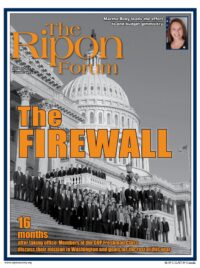
During my decade in Congress I served on the subcommittee of the Appropriations Committee that oversaw the budgets of independent federal agencies. But only through my tenure on the Consumer Product Safety Commission have I learned the extent to which ideology and politics can interfere with rational science-based rulemaking, and lead to job-killing overregulation.
The CPSC has spent the last three years issuing regulations called for by the Consumer Product Safety Improvement Act of 2008 (CPSIA). Congress passed the CPSIA with overwhelming bipartisan support in response to a media scare caused by the recalls of a large number of Chinese manufactured children’s toys. The new law requires manufacturers of children’s products to engage third party labs to test their products, both before and during production, to ensure compliance with all applicable children’s product safety standards. It also empowered the Commission to reduce the lead in children’s products below even trace levels, without consideration of risk.
At every turn, the Commission’s Democrat majority interpreted the CPSIA to broaden its scope and cost, without even seeking to learn whether the costs of its regulations could be justified by their benefits. The pattern was set early with a party-line vote defining the “children’s products rules” to which manufacturers need to third party test, to include long standing rules applicable to general consumer products, such as rugs, lamps and clothing textiles.
…only through my tenure on the Consumer Product Safety Commission have I learned the extent to which ideology and politics can interfere with rational science-based rulemaking, and lead to job-killing overregulation.
The Democrats also narrowly interpreted statutory language permitting an absorbability exception for products containing lead that is locked deep in metal substrate and therefore presents no risk to children. According to the Commission’s majority, an exception was not warranted even for products from which the absorbable amount of lead was so small as to be immeasurable.
The CPSC’s overreach was not lost on Congress. By late 2009, with the bicameral Democratic majority still intact, Congress invited the Commission to recommend statutory changes. But the Commission’s majority refused to recommend the most rational change that could have had the greatest impact: requiring the Commission’s regulation of lead and imposition of third party testing to be based on the risk to public health and safety.
Instead, another two years passed during which the CPSC’s CPSIA based regulations led many manufacturers to reduce the variety of their children’s products, stop making children’s products, or go out of business. Distributors likewise reduced substantially the number of toys imported from Europe, due to our more stringent lead limit and testing rules. Not surprisingly based on these facts, a poll of 622 toy manufacturers and retailers found that 40% planned to eliminate jobs due to the costs imposed by the CPSIA and its regulations.
Finally, in August 2011, a bipartisan majority in Congress amended the CPSIA in an effort to rein in its costs and to provide meaningful, risk-based exclusions from its lead content limits. Its most important and potentially far reaching provision requires the Commission to seek public comment on ways to reduce the costs of third party testing requirements, and to issue new or revised third party testing regulations if doing so will reduce testing costs while still assuring compliance with applicable standards.
At the time the CPSIA amendment passed, the Commission was considering but had yet to vote upon the largest and most widely applicable rulemaking it would ever undertake: the promulgation of protocols and standards for the continued third-party testing of children’s products after initial certification tests, during production. Because of the obvious relationship between the pending rulemaking and Congress’s directive that the Commission seek ways to reduce the costs of third-party testing, the Commission’s career professionals recommended re-proposing the rule governing continued third-party testing, while at the same time seeking public comment on cost reduction.
The Commission’s Democrat majority rejected this alternative and pushed ahead last fall with a vote on a final third party testing rule. In doing so, it was able to pass the rule by a 3-2 vote, avoiding the need to compromise with the Republican minority on any significant issue. The unstated reason for this precipitous action was obvious: in October 2011, the third Democratic Commissioner vacated his seat at the expiration of his final hold-over year. Had the Democrats waited to consider all of the information Congress deemed relevant to the rulemaking, they would have sacrificed their ability to unilaterally determine the scope and terms of the third-party testing rule, without the need for bipartisan agreement or compromise.
The tiny CPSC’s ability to thwart the will of Congress … illustrates the dire economic consequences of ideologically driven regulation unrestrained by objective facts.
The resulting rule is an indefensible assault on American business competitiveness. Commission staff warns that in response to the “significant increase in their costs due to the final rule,” manufacturers will redesign their products to reduce the features and component parts, reduce the number of children’s products they offer, exit the children’s product market, or go out of business completely. The costs associated with the new rule are also expected to be a “barrier that inhibits new firms from entering the children’s product market”, including, in particular, ones serving a niche market, such as products for children with disabilities. Safety and performance related innovation will also be stymied, as manufacturers “delay implementing some improvements to a product’s design or manufacturing process in order to avoid the costs of third party testing.”
Despite recognizing the significant adverse economic impact of the rule, the Commission made no effort to quantify either the costs or the benefits. Indeed, whether there was any proportionality between the costs and benefits of the rule was simply irrelevant to the Democrats’ decision.
The tiny CPSC’s ability to thwart the will of Congress, ignore the President’s call for cost-benefit analyses, and singlehandedly destroy businesses and undermine job growth, all in the service of uncompromising partisanship, illustrates the dire economic consequences of ideologically driven regulation unrestrained by objective facts. RF
___________________________________
Anne Northup is a Commissioner of the Consumer Product Safety Commission. From 1997-2006, she represented the 3rd District of Kentucky in the United States House of Representatives.




